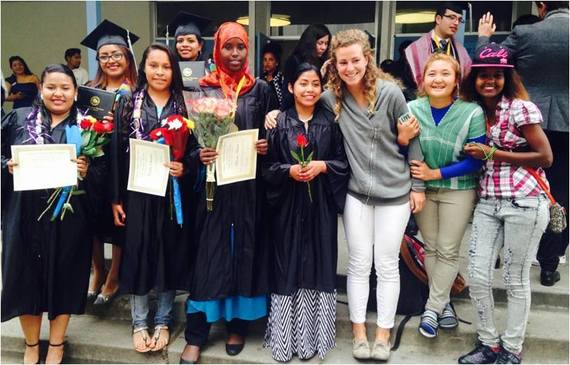Standardized testing is one of the most heated debates in education, with President Obama recently calling for limits on the amount of time kids can spend taking those tests. The expansion of standardized testing came from a desire to ensure that every child in America is equipped with the knowledge and tools they need to be successful. Tests are a logical way to measure progress, reward "high-performance" and increase accountability. However, the subsequent onslaught of tests and outcry from teachers, parents and students alike begs the question: does an outcome-oriented environment undermine the kind of teaching and learning that naturally leads to better students, motivated teachers, and a healthier school culture? All signs point to yes.
While this debate is center-stage when it comes to our schools, the focus on outcomes and accountability for our children's futures is not limited to the classroom. After-school and summer programs are also peppered with demands for accountability, measurement, and evaluation. To be sure, evaluating impact is a crucial piece of investing in solutions that work, and we can all agree that the next generation deserves the best we can give them.
But what happens when outcomes are all that we look for, and all that we see? Under pressure to show immediate, positive results, there is less time to grow, to improve, or to fail. A race for results puts pressure on programs to measure outcomes too soon, with weak methods, and without funding to invest in trained researchers. That race benefits no one; it is time-consuming for practitioners, distracting for supporters, and- worst of all- counterproductive to the long-term investment that our kids need.
I have met amazing parents, teachers, mentors, and coaches, all of whom would say that working with kids is an art far more than a science. There is no exact formula that, when mixed just so and delivered in the perfect dosage will yield perfectly consistent results with every child in every scenario. Kids react to so many variables, and go through so many ups and downs on the path to becoming who they are. That is part of the beauty of growing up, and what makes defining and measuring "success" so complex. A win can be a bad decision that never happened. It can be bouncing back from the one that did. It can be halting a downward spiral mid-drop. It could be raising the ceiling of possibility higher than ever before. Establishing fixed "good" and "bad" outcomes leaves little room for the gray that so often makes up childhood and adolescence. When we live in black and white, it is too easy for young people to fall short of expectations. Serving those most in need requires patience, constant learning, and resilience, all things that are challenging to prioritize in an outcome-oriented environment, most especially one with high stakes and a short timeline.
In Soccer Without Borders, we aim to create pathways to growth, inclusion, and personal success for young people living in some incredibly challenging and complicated situations, including refugees and asylum seekers. Our evidence-based program design was born out of thousands of hours of programming, hundreds of conversations, and countless pages of research. We synthesized it all into a clear theory of change that states what we value, what resources we invest, what activities we deliver, and what actions and behaviors we expect to see. We learned quickly that the only way to achieve powerful outcomes is to relentlessly focus on our process, bringing everyone onto the same page to work toward the same goals. As it turns out, investing in the process leads to some pretty amazing outcomes, as well as an intrinsic motivation to better ourselves when we fall short.
Our goals are intentionally broad; success will look different for different participants and in different locations, and we purposefully leave space for that. Rather than fixate on the ends, we focus on the means, from the training of our coaches, to the accessibility of our activities, to quality of our sessions, to the consistency of our implementation, and the safety of our interpersonal environment. We've been able to quantify this process-oriented approach into a program rubric that shows our progress and points to areas of need. One of the reasons that we have as high as 90% retention rates on our teams is that we don't make participants feel like they are in a "program." They are kids with enormous potential, and it's our privilege to help them realize it, through the good days and bad.
As a youth-serving sector, we need to take this moment to consider where this outcome-oriented road leads. In a single after-school sport-based program, youth participants could have their fitness, weight, body mass index, nutrition knowledge, risky behavior knowledge, psycho-social attitudes, and self-confidence (and more) tested multiple times per year, all in the name of evaluating impact. Programs are funded through three, five, even ten different sources, all with different measurement expectations, and evaluation calendars that rarely align. There are some efforts to change this, from state-wide universal grant resources, to city-wide "collective impact" collaborations. We need more of these. There are also efforts to increase observation-based evaluation, which would be much less intrusive and disruptive to the program culture, keeping the burden of evaluation off of the kids. Yes please.
Even with these promising changes, we need to remember that childhood and adolescence are not easily measured in black and white. Kids are not lab experiments: we cannot standardize their experience to the exclusion of opportunities for individuality. What we can do is reward great process, active learning, and demonstrated impact derived from appropriately-timed, respectful, fully-funded evaluation methods whose purpose is to help make sure that we are doing everything we can for our children's futures.

